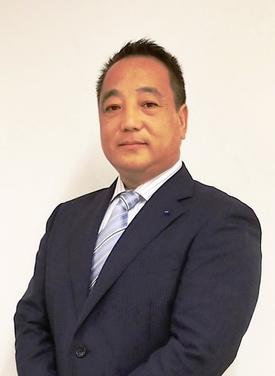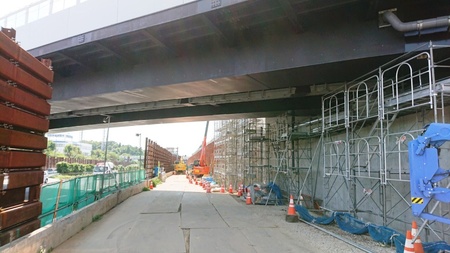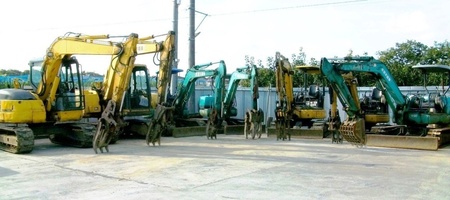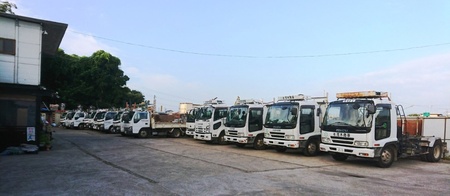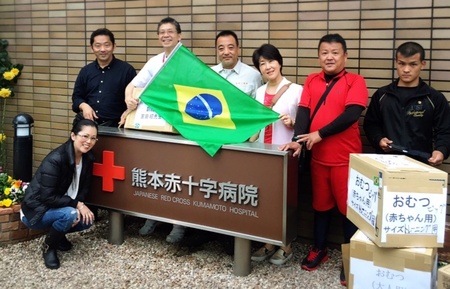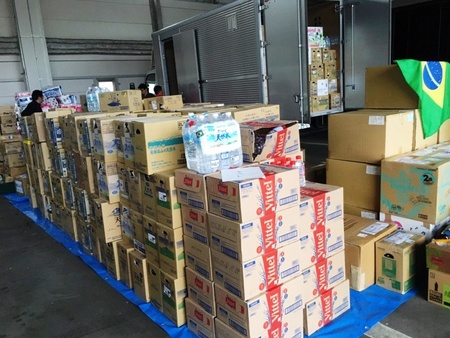It has been exactly 30 years since Shinji Mogi came to Japan. He visited the disaster-stricken areas 17 times to provide support after the Great East Japan Earthquake, and has been involved in support and relief efforts in disaster-stricken areas nationwide, including the Kumamoto earthquake and the floods in Wakayama and Nagano. He is also known as a volunteer activist who has been working for 25 years as the representative director of a Brazilian NPO in Japan, supporting the welfare, health, education, and daily life of Japanese Brazilians in Japan.
Mogi Shoji, founded by Mogi, a second-generation Japanese, is a construction company that has expanded into a variety of construction-related businesses, including the design, demolition and foundation work of buildings and houses, solar panel installation, and (railroad) track maintenance. The company is headquartered in Fujisawa City, Kanagawa Prefecture, and was founded in 1991, and will celebrate its 30th anniversary next year. The company is characterized by the fact that 80% of its employees are Japanese-Brazilian. Having successfully built a promising company that blends into Japan's assimilation-oriented business society, Mogi has a backbone of "making people happy is my purpose in life" in his heart, transcending the world of dekasegi culture, and has produced a manager worthy of the 30th anniversary of his settlement in Japan.
Company management
The Mogi Shoji Group is made up of four companies: Mogi Shoji, which is involved in construction, Mogi Shoji Intertrade, which trades with Brazil, Mogi Shoji R, which is involved in the maintenance of railway tracks, and TECTO Arquitetura e Construcao, which is headquartered in Brazil. In addition, the company has been diversifying into new businesses such as interior and exterior construction of houses, solar panel installation, foundation work, and design in recent years.
So let's take a look at the current company profile. Main business operations: Demolition department focuses on private homes, other departments, (1) Number of employees: 57 (20 in the construction department, 37 in the demolition department), (2) Business area: Mainly the greater Tokyo area, with Kanagawa Prefecture (80%) as the core, (3) Head office site area: 3,300 square meters, (4) Head office building area: 200 square meters, (5) Company-owned construction machinery: 20 large and small excavators in total, (6) Company-owned transport trucks and sales vehicles: 32 in total, (7) Current work situation: There is an increase in work, but even when they advertise, there are no young, good workers.
Mogi says that Japanese-Brazilian employees, who make up 80% of the workforce, are characterized by "their problem-solving abilities for the work they undertake; they are creative and find the best solutions and methods, and they demonstrate this in the workplace."
In the midst of this, the Mogi Shoji Group is expanding its business while taking thorough measures against the coronavirus. They do business with most of the house manufacturers in Japan, and since the company's founding, Mogi says that his dream has always been to become a general construction company, and that the results have led to where he is today.
Moreover, the construction industry demands more Japanese-style assimilation-based interpersonal connections, so how did Mogi, who grew up in the individualistic country of Brazil, manage to enter Japan's construction industry? It all started with a part-time job he took when he first came to Japan to earn money for college, which turned out to be a building demolition company. The company's president entrusted him with responsible work from an early stage after he joined the company. This encounter and connection with the president led to Mogi's independence and his entry into the construction industry.
His management concerns are that "the good human resources who can be entrusted with responsible work are aging." As for the future of the company three years from now, he raised three points: "We will continue to operate the company without debt, as we have done since the company's founding, we will put our efforts into training successors, and we will diversify our business."
When asked how he, who grew up in Brazil, was able to enter the construction industry, Mogi said, "Through my experience, I've learned that while relationships and connections are important in any business, it's more important to be able to discern what is required of you and what you can offer in that regard. The Japanese economy is short of workers in various fields. However, Japan is a wonderful country full of business opportunities. If you can acquire the ability to find those opportunities and have the will to work hard, I believe you will definitely be able to succeed." He spoke of the key to success in life in Japan.
* * * * *
Mogi's time as a Boy Scout determined his outlook on life
Where did his "sense of mission to help people in need" come from? It was in his boyhood activities as a Boy Scout, which built the foundation for his character development. As he said when he was a boy in Sao Paulo, he joined a Boy Scout organization affiliated with Nishi Honganji Temple, and "Boy Scout activities shaped who I am today." This was the origin of Mogi's outlook on life, which is still dedicated to giving back to society and people through volunteer activities.
family
My father, Yasutaro, passed away three years ago at the age of 83. He immigrated from Kiryu City, Gunma Prefecture in 1960 and was a famous Brazilian Nikkei who was known as a professional locksmith. My father taught me, "Anyone can clean the center of a window. However, it's the corners that are seen and are the deciding factor," and my mother told me, "Always be the best."
"Both my parents are Japanese and I'm grateful to have been born into the Mogi family," he said. His mother, Setsuko, still lives in Sao Paulo. President Mogi was blessed with three children, the eldest, Ayane, is a professional Rakugo performer and graduated from Musashino Art University. The second, Saori, graduated from Osaka University of Arts, and the third, Manami, is a student at Tama Art University. All three sisters chose to study at art universities.
Volunteer Activities
Mogi serves as the representative director of the NPO Support for Brazilians in Japan (SABJA, headquarters in Meguro, Tokyo), which was established in 2003 (its parent organization was established in 1995) with the goal of helping Brazilians in Japan adapt to Japanese society and resolve various issues that arise in their daily lives. As an NPO with a long history and a proven track record, the organization carries out volunteer activities centered on education, health, and social support activities for over 210,000 Brazilians in Japan, from the elderly to young children, scattered throughout the country.
Volunteer experts provide telephone and individual orientation consultations on topics such as physical and mental health, education, daily life, living environment, working environment, law, insurance, taxes, etc. Incidentally, there were 1,805 general consultations last year alone, and experts are also dispatched to Shimane and Fukui prefectures, where there are emerging Brazilian communities, to provide individual and comprehensive support activities.
Its daily activities are carried out in cooperation with the Brazilian Embassy in Japan, the three Brazilian Consulates General in Tokyo, Nagoya, and Hamamatsu, various Japanese-Brazilian related institutions and organizations, and private support companies, and it has earned a high reputation and trust as an NPO. It actively interacts with Brazilian communities all over Japan, and with a network it has built up on a national scale and a team of experienced and diverse expert counselors, it is able to meet diversifying consultation needs.
The COVID-19 pandemic, which has been ongoing for more than six months, has led to an increase in the number of Japanese-Brazilians living in poverty, and Mogi said, "In these circumstances, the mission and role of our NPO is growing. We intend to further deepen our collaboration with Brazilian public institutions in Japan and private support companies and organizations to fulfill our mission." When asked what he expects from Brazilian children in Japan through these volunteer activities, he said, "I hope that they will become people who are recognized in Japanese society."
But there is something that motivates Mogi to volunteer. That is, "I have spent every day thinking about what I can do for someone in need, and I continue to do so even now." Mogi's sense of mission and ability to execute are outstanding, as he has been involved in various support activities for many years with the belief that he wants to help people in need.
* * * * *
The mindset of the CEO, Mogi
"Analyzing business opportunities in Japan from a Brazilian perspective and executing them in a Japanese way." His management mindset is "The economy moves in waves and troughs are inevitable, so you need to solidify your foundations in good times, avoid debt as much as possible, diversify risks, not consolidate your customers and business into one, and develop good employees."
Living in Japan for 30 years
At work, "I started from zero and now I am able to help nearly 500 people around me," and as a volunteer, "I worked for two years during the Great East Japan Earthquake" and "I am able to work for the NPO Support for Brazilians in Japan."
Gaining recognition for Brazilian NPO activities in Japan
I think that social contribution activities in Japan are quite advanced. Various activities are realized through joint planning with the NPO SABJA, the Brazilian Council in Tokyo, and other organizations. The Brazilian community in Japan is gradually finding its place and gaining recognition from the Japanese public. Brazilians in Japan are not limited to Brazilian events, but are actively participating in and contributing to Japanese events and activities.
Its relief efforts following the Great East Japan Earthquake, the Kumamoto Earthquake, and the widespread flooding caused by Typhoon Hagibis in 2019 have been highly praised by local residents, the national government, and local governments.
About "Japan's Multicultural Society"
The idea is that if those around you are unhappy, you cannot be the only one to be happy.
(1) It is said that Japan has entered a multicultural society, but it seems that we are still far from being in a good state. It is true that the number of foreigners is increasing, but the country and its people are not at all prepared to accept them. Unless we can design a system and create an environment that accepts foreigners as human beings, rather than simply as short-term workers, which will continue to increase in number, Japan will not improve even in our lifetimes. Naturally, I don't think patriotism will be born.
(2) As a country, we are unsure about how to treat foreigners, but we are making efforts. I think the previous Abe administration demonstrated those efforts well.
My feelings for Brazil are second to none
Brazil is a wonderful country, and has all the conditions to become the best in the world. Personally, I believe that President Bolsonaro is genuine in his desire to make Brazil a better country. However, a country the size of Brazil cannot change with the efforts of the president alone. I think there is little unity or common sense among the Brazilian people and politicians. Democracy is important, but nothing will change unless each citizen cooperates.
"Brazilians need to understand that they were born in the greatest country in the world, and that the whole of Brazil is their home. At the same time, education needs to be strengthened. The issue is how education funds from the state are being used, and it is important to protect them from bad politicians."
At the same time, he said, "Japan has the fastest aging population in the world, and various problems arise as a result of this. The number of workers supporting the economy is decreasing, and as a result, the number of taxpayers is decreasing. One option for Japan to solve this problem is to invite young people living overseas to Japan. Brazil and Japan have had a very good relationship for a long time, and I think now is the time for us to strengthen our support for each other. In this regard, the presence of Japanese Brazilians will be important. The Japanese government is creating various projects to welcome Japanese Brazilians living overseas. I believe that the partnership between Brazil and Japan will strengthen and that they will work together in various ways, so I am participating in several projects both personally and as SABJA. I believe that the future of Brazil and Japan will be a wonderful one."
*This article is reprinted from the Nikkei Shimbun (November 4, 2020).
© 2020 Kanno Hideaki


